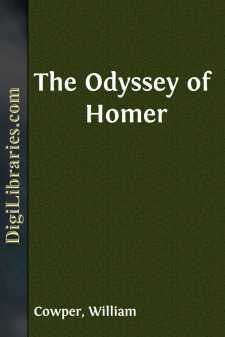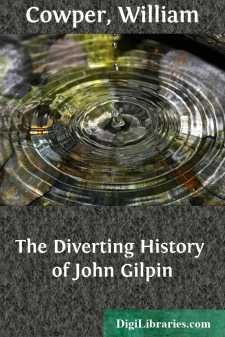Categories
- Antiques & Collectibles 13
- Architecture 36
- Art 48
- Bibles 22
- Biography & Autobiography 813
- Body, Mind & Spirit 142
- Business & Economics 28
- Children's Books 17
- Children's Fiction 14
- Computers 4
- Cooking 94
- Crafts & Hobbies 4
- Drama 346
- Education 46
- Family & Relationships 57
- Fiction 11829
- Games 19
- Gardening 17
- Health & Fitness 34
- History 1377
- House & Home 1
- Humor 147
- Juvenile Fiction 1873
- Juvenile Nonfiction 202
- Language Arts & Disciplines 88
- Law 16
- Literary Collections 686
- Literary Criticism 179
- Mathematics 13
- Medical 41
- Music 40
- Nature 179
- Non-Classifiable 1768
- Performing Arts 7
- Periodicals 1453
- Philosophy 64
- Photography 2
- Poetry 896
- Political Science 203
- Psychology 42
- Reference 154
- Religion 513
- Science 126
- Self-Help 84
- Social Science 81
- Sports & Recreation 34
- Study Aids 3
- Technology & Engineering 59
- Transportation 23
- Travel 463
- True Crime 29
The Odyssey of Homer
by: William Cowper
Publisher:
DigiLibraries.com
ISBN:
N/A
Language:
English
Published:
1 year ago
Downloads:
25
Categories:
*You are licensed to use downloaded books strictly for personal use. Duplication of the material is prohibited unless you have received explicit permission from the author or publisher. You may not plagiarize, redistribute, translate, host on other websites, or sell the downloaded content.
Description:
Excerpt
ARGUMENT
In a council of the Gods, Minerva calls their attention to Ulysses, still a wanderer. They resolve to grant him a safe return to Ithaca. Minerva descends to encourage Telemachus, and in the form of Mentes directs him in what manner to proceed. Throughout this book the extravagance and profligacy of the suitors are occasionally suggested.
Muse make the man thy theme, for shrewdness famedAnd genius versatile, who far and wide
A Wand’rer, after Ilium overthrown,
Discover’d various cities, and the mind
And manners learn’d of men, in lands remote.
He num’rous woes on Ocean toss’d, endured,
Anxious to save himself, and to conduct
His followers to their home; yet all his care
Preserved them not; they perish’d self-destroy’d
By their own fault; infatuate! who devoured10
The oxen of the all-o’erseeing Sun,
And, punish’d for that crime, return’d no more.
Daughter divine of Jove, these things record,
As it may please thee, even in our ears.
The rest, all those who had perdition ’scaped
By war or on the Deep, dwelt now at home;
Him only, of his country and his wife
Alike desirous, in her hollow grots
Calypso, Goddess beautiful, detained
Wooing him to her arms. But when, at length,
(Many a long year elapsed) the year arrived
Of his return (by the decree of heav’n)
To Ithaca, not even then had he,
Although surrounded by his people, reach’d
The period of his suff’rings and his toils.
Yet all the Gods, with pity moved, beheld
His woes, save Neptune; He alone with wrath
Unceasing and implacable pursued
Godlike Ulysses to his native shores.
But Neptune, now, the Æthiopians fought,30
(The Æthiopians, utmost of mankind,
These Eastward situate, those toward the West)
Call’d to an hecatomb of bulls and lambs.
There sitting, pleas’d he banqueted; the Gods
In Jove’s abode, meantime, assembled all,
’Midst whom the Sire of heav’n and earth began.
For he recall’d to mind Ægisthus slain
By Agamemnon’s celebrated son
Orestes, and retracing in his thought
That dread event, the Immortals thus address’d.40
Alas! how prone are human-kind to blame
The Pow’rs of Heav’n! From us, they say, proceed
The ills which they endure, yet more than Fate
Herself inflicts, by their own crimes incur.
So now Ægisthus, by no force constrained
Of Destiny, Atrides’ wedded wife
Took to himself, and him at his return
Slew, not unwarn’d of his own dreadful end
By us: for we commanded Hermes down
The watchful Argicide, who bade him fear
Alike, to slay the King, or woo the Queen.
For that Atrides’ son Orestes, soon
As grown mature, and eager to assume
His sway imperial, should avenge the deed.
So Hermes spake, but his advice moved not
Ægisthus, on whose head the whole arrear
Of vengeance heap’d, at last, hath therefore fall’n.
Whom answer’d then Pallas cærulean-eyed.
Oh Jove, Saturnian Sire, o’er all supreme!
And well he merited the death he found;60
So perish all, who shall, like him, offend....






